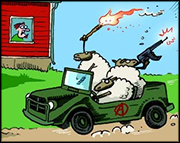|
This surprises me a little, I guess I fell for the stereotypical idea that its a male characteristic to speak monotonously and part of female masking would be to mimic tone. I've always been very sensitive to vocal tone (it's a musical thing to me), so I think it's probably part of my masking.
|
|
|
|

|
| # ? Jun 3, 2024 16:31 |
|
Looking back on it, I only started unconsciously trying to mask my tone in college, in my high school my nickname was "robot" (it never occurred to me why! I thought it was because I was good at math!) and after graduating college I did visit and meet up with high school people and they were all "oh wow you sound so much better". I think I had one teacher mention it in 5th grade offhandedly that I forgot until that phonology class and some remarks at work about how I'm good at using digital voice assistants (I get to do all the customer demos for work that use one haha), so I guess it's something everyone notices but no one mentions.
|
|
|
|
Lately, I've had to record my own voice for a project at work and I've been very surprised at how monotone I am. People have always told me they can't tell when I'm joking or when I'm expressing emotions, but I never believed them because my experience didn't align with that.
|
|
|
|
Is getting really anxious when you can't find something a particularly autistic thing? Merely a neurotic thing? Maybe everyone is like this?
|
|
|
|
I have it too, but I've never associated it with autism. Just seems to be a thing a lot of people have.
|
|
|
|
I don't know if I'm monotone or not, I've always appreciated the lyricism of speech with well-executed varied pitch of course, the haphazard application of it is probably one of the things that contributes to regularly getting asked if I have an accent. you can have a sentence with completely american vowels and consonants but if you accidentally drop the pitch of the last syllable in a question ("did you bring the thing?" vs "did you bring the thing?") people will clock it as a british accent. people by and large seem to have no idea what we're doing with our voices unless one of our invisible standards is broken and then it's like "I don't know why this person's voice sounds weird, but it's weird as hell." maybe you can grab one thing like "monotone" to diagnose, but a lot of the time people will just conclude the speaker is Not From Around Here after years of study I have deduced that the second thing that contributes to regularly being asked if I have an accent is pedantic pronunciation, the third is not liking flat/nasal vowels, and the fourth is being from the ozarks
|
|
|
|
It's pretty weird. I speak very robotic when I am unaware of my speech but on the flipside I am very sensitive to the tone of voice of others which has probably to do with the fact that I'm always busy with filtering out possible figurative meaning of their speech. Little abnormalities can result a feeling of hostility towards the person in question. Same goes for their prhaseology. I can get highly annoyed when I sense for example my wife picking up tones and words clearly being used in her previous conversations with for example her friends or collegues. It' really tiresome at times but also gives me a pretty cool special interest. Words, entymology and related stuff Shame I am not smart enough to convert all this into the English language, the language of my favorite website, a dead gay forum Monstaland fucked around with this message at 10:50 on Feb 1, 2022 |
|
|
|
Klaaz posted:It's pretty weird. I speak very robotic when I am unaware of my speech but on the flipside I am very sensitive to the tone of voice of others which has probably to do with the fact that I'm always busy with filtering out possible figurative meaning of their speech. Little abnormalities can result a feeling of hostility towards the person in question. Same goes for their prhaseology. I can get highly annoyed when I sense for example my wife picking up tones and words clearly being used in her previous conversations with for example her friends or collegues. I do the same thing, but to the extent that it's harmful sometimes. I'll be hyper-vigilante about how people are speaking, which can sometimes result in me picking up on a meaning that isn't there because the person who I'm listening to isn't being careful about the way they're speaking to me. It can be really frustrating. There are times when I watch other people interacting and become really depressed because the back-and-forth flow of conversation. I find myself wondering how people know exactly what to say when talking to someone else and why I can't seem to have the same intuition. It really sucks.
|
|
|
|
Dr.D-O posted:I do the same thing, but to the extent that it's harmful sometimes. I'll be hyper-vigilante about how people are speaking, which can sometimes result in me picking up on a meaning that isn't there because the person who I'm listening to isn't being careful about the way they're speaking to me. It can be really frustrating. Yeah I can really relate with this. I have the same in social settings, I have a hard time processing all the social dynamics going on in social groups larger than, well actually two persons. For example during a work related reception I can get really confused, annoyed or even hostile. People talk to you in a one on one situation entirely different they do in a larger setting. Attitutes towards you or others can change completely dependable on who enters or leave the social group. I can get really upset internally during such changes and I do pick up everything, small tones in voices, use of language, the sound of their laughter, sudden bravoure or any abnormality affected by the change in social composition. I do realise all this is very natural and part of human social behaviour but i cannot ignore it. It doesn't make me a very pleasant person during parties I guess. Alcohol does help though. Monstaland fucked around with this message at 17:20 on Feb 4, 2022 |
|
|
|
I have a question: what is the most annoying thing about neurotypicals?
|
|
|
|
I'm not sure what you're trying to get at, so I'm gonna pass.
|
|
|
|
Better question: i have a new coworker who reminds me of me when I was younger and I'm 99% sure she's also autistic. There isn't really a good way I can bring it up though right? She's pretty young and I guess I want to make sure she knows and also she might feel better if she knows she has someone she can talk to about this stuff in the work context who Gets It. But I don't think there's a reasonable way to go hey so you're autistic right?
|
|
|
|
I think you never should do that, they might just not be autistic or not know it yet, so best way is to somehow tell them about your autism if you really want to and see what happens from there
|
|
|
|
Yeah, that's what I do when I suspect someone is autistic. I also try to not make eye contact with them: though I do it reflexively because of childhood ABA training, I know it's uncomfortable for most of us.Nirvikalpa posted:I have a question: what is the most annoying thing about neurotypicals? Most of them want us to conform to their way of doing things and are unwilling to accommodate our needs. But autistic people are "inflexible."
|
|
|
|
Nirvikalpa posted:I have a question: what is the most annoying thing about neurotypicals? When they don't say what they mean, but then are mad at you when you believe the words they say. Second place is accusing ND people of lying because of whatever "tell" they would apply to neurotypical people like avoiding eye contact or over-explaining. But I think that one is just a personal sore spot as I was called a liar a LOT as a child and it never clicked for me until much later why.
|
|
|
|
I've straight given up on eye contact. I am also accepting that I will be alone forever. Accepting is probably the wrong word. Resenting feels more correct and yet worse.
|
|
|
|
When they tell you to do x but then get angry when you didn't also do y despite them not telling you to. For example asking to vacuum the carpet in a short corridor and then asking why the floor wasn't also vacuumed when they clearly specified "carpet" instead of saying the corridor if they wanted the whole thing vacuumed.
|
|
|
|
Poil posted:When they tell you to do x but then get angry when you didn't also do y despite them not telling you to. For example asking to vacuum the carpet in a short corridor and then asking why the floor wasn't also vacuumed when they clearly specified "carpet" instead of saying the corridor if they wanted the whole thing vacuumed. Lolllll I had so many arguments with my mother about that growing up "Unpack the dishwasher please" "Ok" [Later] "why didn't you pack the dishwasher after you unpacked it??"
|
|
|
|
Do you have two seconds? While taking half a minute, still annoys me immensively
|
|
|
|
Itís frustrating when Iím critiqued on not reading body language very well then accused of being paranoid that Iím upsetting people when they roll their eyes or cross their arms.
|
|
|
|
More of a question for op if he's still around or for other people here. How did you find out/learn/get diagnosed? Was there a doctor? Did you just kind of figure it out? I'm on the spectrum, but I didn't realize it until a couple years ago when I got a therapist. She asked me after our first session if I was autistic, and I was like wtf. So I talked to my wife and she said yeah of course. That was news to me. I always just thought that I was just different than everyone else, or I just didn't put as much worth on social aspects and stuff. Funny part is I had read about masking and knew what it was, I just thought to myself 'well yeah but when I'm trying to fit in by understanding what others are thinking all the time, that's just normal, everyone does that' Really helped me understand a lot of my interactions with other people. Anyways the reason I'm thinking about this more lately is that my mom was in the hospital(dying) in November so I drove down to see her for the first time in about a decade and we were talking about my diagnosis and she says, "oh yeah Dr So-And-So(our family doc) thought you might have been autistic since you didn't start talking until super late, but I knew you were just special and I thought that a label like that would hurt you, so I never got you tested!"
|
|
|
|
|
I got diagnosed when I was little, but my parents did not disclose to me until I was a teen and Dad noticed me reading a popular science article about autism. If any parents out there are wondering if they should disclose their child's diagnosis to them, I'm going to tell you now: just do it. You may think it's better for your kid to "grow up without a label," but their peers and teachers are going to label them anyway. And most of those labels are going to be a lot nastier than any diagnostic term.
|
|
|
|
Wtf who doesn't tell their kid and important fact like that about them. I thought I was probably autistic ever since I was a teenager, I just related to a lot of autistic traits. I think the one that really tipped it over for me was learning that sensitivity to textures could be part of it. I just waited until I had a stable well-paying job to get diagnosed because it's expensive and I didn't need it to get access to support because I didn't really need much support.
|
|
|
Organza Quiz posted:Wtf who doesn't tell their kid and important fact like that about them. An abusive parent lmao there's a reason I hadn't talked to her for a decade
|
|
|
|
|
Organza Quiz posted:Wtf who doesn't tell their kid and important fact like that about them. Short answer: Ableists. Longer answer: Lots of people worry that if their kid knows they are neurodiverse, the kid will grow up feeling limited by that label. This has more to do with society's attitude around disability -- that disability is "limiting" and disabled people are always miserable in their awareness of their disability -- than the material reality of growing up neurodiverse. I don't have data to back this up, but I get the sense that getting a diagnosis is a happy experience for most neurodiverse people. Yes, it means getting a stigma put on you, but you probably grew up stigmatized as a "weirdo" or worse already. Knowing how and why you're different and how you can find support feels freeing. This song from "Crazy Ex-Girlfriend" is about getting a BPD diagnosis, but I think a lot of neurodiverse people can relate to the optimistic feeling the song expresses: https://www.youtube.com/watch?v=uic_3vlI5BE Fake edit: https://twitter.com/Joi_the_Artist/status/1488546858448211969?s=20&t=w-8BXp9AB9SD7u-Ie2TM-g
|
|
|
|
Pththya-lyi posted:Short answer: Ableists. Me: Haha, that autism meme sure reminds me of me when- Oh. Oh. (p much my actual thought process. )
|
|
|
|
My parents told me I was autistic at a young age and then became frustrated when I didn't just act normal as I grew up. Like I was just going to stop being autistic one day. No wonder I'm emotionally distant with my family now. A family of people that never accepts you for who you are isn't a family, it's just a collection of people you have similar genes to.
|
|
|
|
I haven't finished the thread yet, but I am starting a job working with autistic adults, and my experience with the community is very lacking. Are there any recommendations for a good documentary to gain insight on autism/autistic persons in particular? Preferably on prime video or youtube. Sorry if I missed any linked previously. Le Faye Morgaine fucked around with this message at 22:55 on Feb 21, 2022 |
|
|
|
Autism is too broad a spectrum for a documentary to properly cover. You're better off asking for books.
|
|
|
|
Sorry for the wall of text, but I'm glad to have found this thread and have a place to talk about this.. My oldest son was diagnosed at 2. Wife and I thought he was just a "shy kid" because when the doc told us to get him checked out, he was lacking eye contact. We didn't think anything else of it, but now it all makes sense. The doc has probably seen tens of thousands of kids in his career so he probably saw our son exhibit some hallmark traits. My wife and I were upset, almost feeling offended he would tell us about our child.. We've eaten crow since then, but it's interesting to see how our kids grow. His younger brother is NT and we've spoken to him a bunch of times about what's up with his brother, so he's been a trooper dealing with it. We've gotten him ABA, Speech, OT, and amazingly OT is off the table now after 2 years of working with some amazing therapists. ABA was fine when he was younger, but he knows how to fend for himself now, so that's also one less thing for us to deal with. Speech is definitely still something he needs help with, but at least he's getting better. He didn't really talk much until he was 4-5. We bring him to a couple of social classes each week with other kids that have social issues so he gets some time to practice. It seems to have been helping.. One thing that's been really helping us is that he's in a general education classroom now. He used to go to this all inclusive private school because the school district wanted to send him to a special day class, but the class had some really tough kids in there.. I don't think our son would have learned anything. I think there were only 6 kids in the class, and there was one kid that was stuck on trying to catch a fly that flew in. We were only observing for 15 minutes, and the aides spent a solid 10 chasing that fly out.. With GenEd, our son is at grade level with math (other than confusing word problems), but reading/writing is still at 1st/2nd grade level, but at least it's progressing. He's definitely improving in speech and picking things up from other kids, good and bad. Just a few weeks ago we saw something weird and he said "what the...heck" and I gave him a look, asked him "what did you say" and he just knew that heck was a "bad" word and didn't repeat it. Its weird to type out but it definitely feels like progress. After our son got the diagnosis I certainly feel like I exhibit some similar traits, but a lot of it is just straight social awkwardness I never understood until halfway through college. I remember the very moment it just hit me too. I don't think I've ever talked to anyone about this stuff so it's kinda nice to get it off the chest. I had friends in high school, but the interactions were limited enough that people didn't think I was off or whatever. I remember a bunch of instances where I pissed people off (intentionally, thinking it was all in "good fun" when it was just making people upset). I was roommates with someone in HS that I happened to not piss off, and when that group of friends came to visit "us" (or so I thought) I was basically ignored while we showed them the campus and grabbed dinner. I thought they were just better friends, but I was definitely being ignored. Then one weekend they were going to celebrate someone's birthday and my roommate slipped and told me about it. He told me to call him on Saturday for the location of the party. Saturday came, I got ready, called him up and..nothing. He usually answered his phone or at least called me back in a few mins, but this time I didn't get any calls back or even a text. Turns out all those folks we hung out with in high school hated me, and I realized they told him not to invite me. That was the exact moment I finally understood what was going on. It was a long day because I was waiting for his call for literally hours and when the afternoon came (party was supposed to be for lunch) I was devastated. The following days after, all the weird interactions from high school replayed over and over in my head and I realized how much of a jerk I was to a lot of those folks I considered friends. One instance is when we had prom, we had a group photo scheduled but nobody told me when, and I remember folks whispering to each other "it was time" but nobody ever told me. They took the photo and I was left out. I feel like I understood something was off that time, but I didn't think too much of it. I realized I needed to fix my social habits in college, so I basically just emulated what other people did and acted differently; it certainly felt like I was being "fake," but I was finally accepted into social circles the second half of college. I think I ended up overcompensating for being mean in my past, so I then started to have some trouble when I started my first couple of jobs out of college. I was "consulting" (with zero years of experience I don't know how one can consult, but that's what I was doing..) and would always be super quiet during meetings because I was afraid of saying the wrong thing. After a few tough conversations with my bosses I opened up more but then went the opposite way and spiraled to being that guy with no filter. It got pretty bad and honestly I'm surprised I didn't get called into HR for saying dumb things to my colleagues. I think things are fine now, and I definitely have to act while at work, but it all feels normal now. Especially when I talk to other people that are introverts that tell me they are "tired of dealing with people" that's basically how I feel after a day full of meetings asking how people are doing or telling them about my weekend when I don't really care and just want to get some work done.
|
|
|
|
I had an experience similar to that in its cause and effect, and it made me a better person, not just better adjusted socially, so I appreciate it myself. Comparing how your kid's doing to my own childhood, you did good by your son. I was in those classes you helped him avoid, and I'd say you were right to make sure he wasn't in that "private school." I don't know who they are or what they do really, but judging from the description, it sounds like they were in there for problems that were determined to be "behavioral problems," like causing disruptions or having tantrums. It's not good for actually getting an education. All in all, it seems very relatable to me, and if I was to make one suggestion not just for you and your son, but for everyone coming to grips with it, it's this It's good to get along, and it's good to act right so you don't hurt people. There are things you can learn about how to talk to people, what's appropriate, what's not appropriate, and what can get you liked. However, it's not good to pursue being liked as its own goal, because that will hurt you in the long run when you find people who will simply never like you. You also need to be aware that everyone has their own mind and history, and for some people, there is no answer to being liked. Maybe they just don't like people in general. In any case, you can't let that be a burden or blame you put on yourself, not just for the sake of your mental health, but because you can't be friends with everyone, and to be your own person, you have to know what kind of person you want to be. No one is everyone's friend, and if you chase that, you'll never have time to be yourself. You can be friends with people just by being nice. You don't need to be friends with people who don't want to be friends with who you really are.
|
|
|
|
Yeah that definitely resonates with me. When I first went on this "reflection of my social life" period, my initial goal was to be liked by everyone, but then realized quickly that there are assholes I don't want anything to do with anyway. I'm sure that's how people felt about me in high school. Now I just want to be a net positive in the world, but I definitely setup my limits and need to teach my son the same. One thing I want him to do better is to advocate for himself. Just the other day the kids came home with a bunch of trinkets from school for Valentine's day, and his brother saw one of those plastic bubble popper things our oldest got, and he setup a trade for some crappy toy he got. He didn't care at the time, but eventually took it back because he realized how much more he wanted that popper toy. To clarify, the private school our son went to was the "all inclusive" one that we preferred, the public school was the one that wanted to send him to the special day class (SDC) with the fly kid, which we absolutely didn't want. The private school was fine and definitely helped him do basic things like eat his lunch. Feeding him took hours sometimes, but now he eats everything without complaint. We had to pull him out and COVID was the thing that kick started it all. Everyone was doing remote learning, so we got to see first hand what the private school was doing. It was a real eye opener because we saw they would spend literally HOURS watching videos of "how things work" and the homework was light, but we ended up being their teachers. It was completely bonkers to us. Not to mention for being "all inclusive" they kicked him out of their after school program, which they consider not part of their inclusion program for whatever reason, because I complained they were watching too much TV. 1 hour of TV during lunchtime and 2 hours afterschool is ridiculous for any child, especially if you're paying for it through a private school. I don't know how/why the other parents are OK with that. We had another meeting with the public school during COVID, and they said they'd let him in the general education class with a shared aide. A lot of it had to do with our son's performance on their assessments and that he wasn't violent (knock on wood), so they didn't have much of a case to put him in an SDC. So remote learning was a bit of a blessing for us, because he was able to see what the other kids were doing and we could see how much better the GenEd class was (it was 1000x better). So we stopped paying the private school and withdrew from that mess. Our son has made some pretty incredible improvements, so he's "earned" that seat in the GenEd classroom IMO. I don't think he has many friends, but his classmates seem to all be fine with him and we haven't heard any parent complaints which is huge for us. His current teacher is amazing too, during our last meeting she asked about his social well-being, because she always sees him just walking around by himself at recess and lunchtime. I guess he doesn't really care; we ask him about his friends all the time and he doesn't bring it up, but doesn't seem to be craving for that level of social interaction. I'm hoping one day he'll go through a similar reflection period as I did (hopefully sooner rather than later), and it'll all make sense to him..
|
|
|
|
Le Faye Morgaine posted:I haven't finished the thread yet, but I am starting a job working with autistic adults as a direct support professional, and my experience with the community is very lacking. If you're looking for bite-sized infodumps, I recommend blogs that regularly get contributions from autistic people, like Neuroclastic and Thinking Person's Guide to Autism. I would especially point you to these TPGA articles on dealing with meltdowns and other problem behaviors as the most relevant to your current job. Remember that autistic people, like all people, are not just a cluster of behaviors: we have internal motivations that may not be immediately obvious to you. We often have sensory issues that can make certain situations overwhelming; we may have problems with regulating, communicating, or even identifying our true feelings. You will most likely have to do a bit of extra effort to draw out what's going on under the surface, and you will not be able to make everything perfect for your clients. But I think if you put in work to understand your clients' motivations and the causes of their struggles, and to support them and their goals, you will see them do well under your care. E: Oh, and how could I forget Welcome to the Autistic Community, a FREE, plain-language ebook explaining the ins and outs of being autistic? If you read one chapter, it should be Chapter 9: Being An Ally, but the entire book is useful to anyone who who is autistic, thinks they might be autistic, or wants to support autistic people in their lives. Pththya-lyi fucked around with this message at 22:52 on Feb 16, 2022 |
|
|
|
Bank posted:I guess he doesn't really care; we ask him about his friends all the time and he doesn't bring it up, but doesn't seem to be craving for that level of social interaction. I'm hoping one day he'll go through a similar reflection period as I did (hopefully sooner rather than later), and it'll all make sense to him.. I'd caution you on one thing there about the not caring. Part of the difficulty in expression is expressing that you care about things, or even that you crave them. To be honest, I preferred being by myself as a kid, but thinking back on it, I liked hanging out with friends more when it was actually a good time. I wouldn't talk about my friends like that though, and having good interactions with my friends was difficult. I don't know if that's how it is for your son, just relaying my own experience, which had a lot more trouble and a much more dysfunctional home life. I would just caution you on taking those expressions at face value because that ignores the challenge you're dealing with. Just as a personal thought, not any kind of expert advice, but my mom was an occupational therapist and when I was growing up, she'd tell me that I needed to respond in certain ways or whatever, like she was giving me the rules to follow. I can appreciate that as a tired middle-aged man, cause I just want the results now. But as a kid, I didn't care about any of that because I had no reason to care. I'd experienced bad things and I wanted to be left alone. Telling me a list of things to keep in mind wasn't going to work anyway, and you weren't going to make me say hello in a way that sounds friendly to everyone just by telling me to do it. What I think would have worked better for me, and what would have made me a happier kid, is if I had simply been rewarded emotionally by seeing positive responses for good things and being positively engaged by people who worked to draw those responses out of me, rather than simple telling me to do them. It seems like your main goal is to bring up a happy, well-adjusted kid. I think you're doing great with that alone.
|
|
|
|
Pththya-lyi posted:If you're looking for bite-sized infodumps, I recommend blogs that regularly get contributions from autistic people, like Neuroclastic and Thinking Person's Guide to Autism. I would especially point you to these TPGA articles on dealing with meltdowns and other problem behaviors as the most relevant to your current job. Thank you so very much for those blogs and links! I appreciate how many are written by ND people themselves with their own perspectives mixed in. I especially want to get the correct terminology down, since its one of the easiest ways to outright offend. I am aware of the obvious no-no's, but there might be more recently adopted nuances I am not aware of yet. (like the differences between using neurodivergent vs Neurodivergent vs ND) I was just looking for some kind of 'day in the life' specials or docs, if there were any famous ones I didn't know about or ones that resonated with others. I know that you can't view autism in broad strokes like that, but at least I could start by appreciating what an individual's experience might be like first. Its really a shame that they got rid of the up/downvote system for youtube, otherwise I could look a lot more easily on my own for good videos. I wanted videos because I am a visual learner and think a lot can get lost when you can't observe a speaker as they talk that otherwise goes overlooked. I want to see and hear their stories. Le Faye Morgaine fucked around with this message at 22:54 on Feb 21, 2022 |
|
|
|
Le Faye Morgaine posted:I was just looking for some kind of 'day in the life' specials or docs It's been a while since I've seen it, and I don't know the community's overall impression of it, but I found the 2010 Temple Grandin movie to be both informative and entertaining. While primarily a dramatic story for general audiences, I did identify a lot with the protagonist's struggles and triumphs.
|
|
|
|
I honestly really enjoyed Please Stand By, which I saw last night. Even though it's a fiction movie not directly based on any real person, and the main character is played by a neurotypical actress, I appreciated it for centering the autistic character's perspective and agency. Plus, it's about being a Star Trek fan, so you might like it if you're into that.
|
|
|
|
I watched Reacher the other day and by the second episode I was convinced that character is autistic. Pretty sure neither the writers or actor intended it that way but it's how I read him.
|
|
|
|
My son was diagnosed last year (OT during the pandemic was terrible) and over the past 18 months Iíve slowly come to the realization that this is why Iíve felt different my whole life. Iím glad this thread exists.
|
|
|
|

|
| # ? Jun 3, 2024 16:31 |
|
impossiboobs posted:When they don't say what they mean, but then are mad at you when you believe the words they say. I pretty much exclusively make eye contact only when lying. It's hilarious how easy it is to just say whatever I want. That's also a second thing, it's very easy to say things when I'm joking and sound serious. That's why I avoid being serious so noone has to get confused.
|
|
|









































